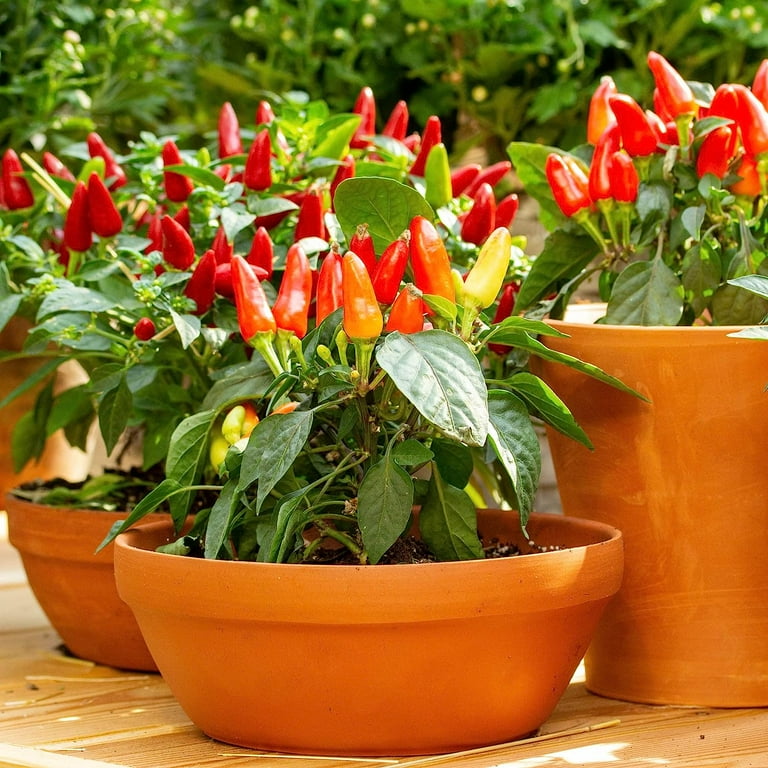The Ultimate Overview to Fertilizing Peppers: Enhancing Development and Taste Normally
As pepper lovers look for to grow durable plants generating tasty fruits, the function of fertilizing becomes vital in attaining these goals. The journey to recognizing the complex equilibrium of nutrients that peppers require for optimal growth and taste is a nuanced one. By discovering the advantages of natural fertilizers, opening the keys behind pepper plant nutrient needs, and diving right into the realm of natural fertilizer options, a globe of opportunities arises for boosting the vigor and taste account of these cherished plants. Keep tuned to discover the key practices and remedies that can raise your pepper-growing undertakings to brand-new elevations.
Advantages of Natural Plant Foods
All-natural plant foods offer a range of benefits that contribute to the total health and performance of pepper plants. By improving the dirt with natural matter, such as compost or manure, natural plant foods improve its water retention capability and nutrient-holding abilities, creating an extra friendly setting for pepper plants to grow in.
Furthermore, natural fertilizers sustain a varied and active dirt microbiome, promoting beneficial microbial activity that aids in nutrient recycling and uptake by the plants. This microbial activity can help subdue unsafe virus and conditions, decreasing the need for chemical treatments. Furthermore, all-natural plant foods advertise long-lasting dirt wellness by preserving a well balanced community underground, which subsequently supports the overall wellness and strength of pepper plants above ground.
Recognizing Pepper Plant Nutrient Requirements
Having actually developed the advantages of organic plant foods in enhancing dirt health and advertising microbial task, the emphasis currently moves to recognizing the details nutrient demands crucial for optimal development and taste in pepper plants.

Understanding the certain nutrient demands of pepper plants is vital for achieving plentiful harvests with superb taste. By supplying the best balance of nutrients with organic fertilizers or soil modifications, farmers can guarantee healthy and balanced, strenuous plants that generate flavorful peppers throughout the growing season.
Organic Plant Food Options for Peppers
In boosting the development and flavor of pepper plants, choosing the proper natural plant foods is an essential consideration. Organic plant foods offer a all-natural and lasting way to nourish pepper plants without introducing damaging chemicals to the dirt and setting.
One more effective organic plant food for peppers is aged manure. Rich in nitrogen, phosphorus, and potassium, aged manure supplies a well balanced nutrient mix that sustains vigorous growth and abundant fruit production (best fertilizers for peppers). It is necessary to utilize well-aged manure to stop burning the plants with excess ammonia
Fish emulsion is a fast-acting natural plant food that supplies pepper plants with a quick increase of nutrients. Originated from fish waste, this plant food is high in nitrogen, making it specifically helpful during the very early phases of pepper plant growth. Fish emulsion is simple to apply and is readily taken in by the plants, advertising healthy and balanced vegetation and strong root advancement.
When selecting a natural fertilizer for peppers, consider the details nutrient requirements of your plants and opt for choices that straighten with he has a good point your gardening techniques and values.
Finest Practices for Fertilizing Pepper Plants
Taking into consideration the relevance of choosing appropriate organic plant foods for pepper plants, carrying out best practices for fertilizing is necessary to guarantee ideal development and flavor development. It is also vital to feed pepper plants at the appropriate time, usually prior to growing and throughout essential growth stages such as flowering and fruit advancement.
One more essential technique is to stay clear of over-fertilization, as this can lead to nutrition inequalities, stunted growth, or perhaps plant damage (best fertilizers for peppers). Complying with advised dosage instructions and not surpassing them is crucial for the general wellness of the pepper plants. Additionally, integrating organic matter right into the dirt with garden compost or mulching can assist enhance dirt framework, water retention, and nutrient accessibility, advertising healthier pepper plants with boosted taste accounts. By adhering to these best methods, you can effectively nurture your pepper plants and attain abundant harvests with premium taste and quality.
Troubleshooting Common Fertilizing Issues

pH inequality is another concern that can affect nutrient uptake in pepper plants. When the dirt pH is expensive or also low, specific nutrients end up being unavailable to the plants. On a regular basis examining the soil pH and making modifications making use of natural changes can aid maintain an appropriate pH degree for optimum plant development. Lastly, irregular fertilization methods can lead to irregular growth and fruit growth. Developing a normal fertilizing schedule and following recommended application prices can aid avoid this issue and ensure healthy and balanced pepper plants throughout the expanding season.
Final Thought
In conclusion, utilizing all-natural fertilizers his comment is here can significantly enhance the growth and flavor of pepper plants. By comprehending the nutrient needs of pepper plants and choosing natural plant food options, garden enthusiasts can efficiently promote healthy and balanced and strenuous growth. Complying with finest techniques for feeding pepper plants and repairing common fertilizing problems can aid guarantee effective growing of peppers. On the whole, appropriate fertilizing methods are vital for optimizing the return and quality of pepper plants.
By checking out the advantages of natural plant foods, unlocking the tricks behind pepper plant nutrient requires, and delving right into the realm of organic fertilizer choices, a globe of possibilities arises for enhancing the vigor and flavor account of these beloved plants.Fish solution is a fast-acting organic plant food that provides pepper plants with a fast increase of nutrients. It is additionally vital to feed pepper plants at the ideal time, typically prior to planting and during key growth phases such as flowering and fruit advancement.
By understanding the nutrient needs of pepper plants and picking natural fertilizer options, gardeners can successfully promote vigorous and healthy and balanced growth. Complying with best practices for fertilizing pepper plants and troubleshooting common fertilization issues can assist guarantee successful growing of peppers.